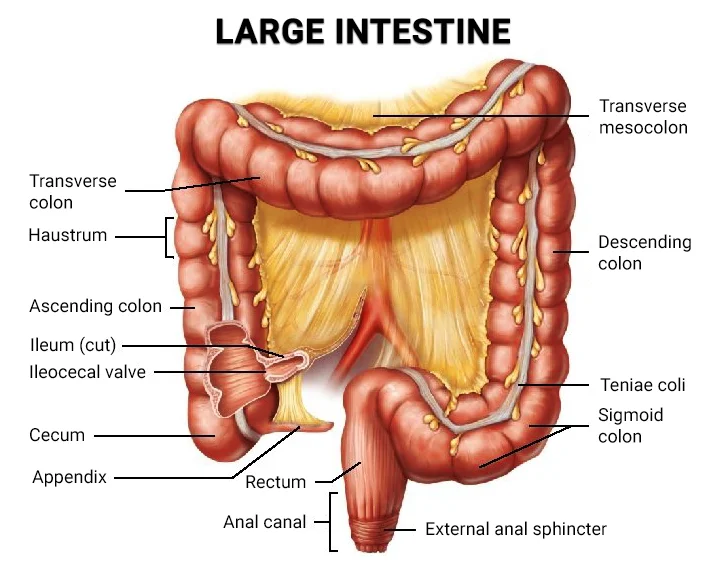Nestled deep within our digestive system lies an organ often overshadowed by its smaller counterpart, the small intestine. Yet, the large intestine, also known as the colon, plays a pivotal role in the process of digestion and overall health. In this comprehensive exploration, we unveil the intricate functions of the large intestine, shedding light on its indispensable contributions to our well-being.
Understanding the Anatomy and Functions of the Large Intestine:

Before delving into its functions, let’s unravel the anatomy of the large intestine. Positioned in the lower abdomen, the large intestine is a tube-like organ that forms the final segment of the gastrointestinal tract. It begins at the cecum, where it connects to the small intestine, and extends to the anus. The large intestine consists of several distinct regions, including the cecum, ascending colon, transverse colon, descending colon, sigmoid colon, and rectum.
Absorption of Water and Electrolytes:
One of the primary functions of the large intestine is the absorption of water and electrolytes from the indigestible residue that passes through it. As food moves through the colon, water is reabsorbed into the bloodstream, aiding in the maintenance of proper hydration levels in the body. Electrolytes such as sodium and potassium are also absorbed, contributing to fluid and electrolyte balance.
Formation of Feces:
As water is absorbed from the indigestible residue, the remaining material becomes more solidified, eventually forming feces. Feces consist of undigested food particles, bacteria, bile pigments, and cellular debris. The large intestine plays a crucial role in the compaction and storage of fecal material until it is ready to be eliminated from the body.
Fermentation of Undigested Material:
The large intestine has several million bacteria collectively called gut microbiota microbes play a vital role in fermenting undigested carbohydrates, fibre, and other substrates that escape digestion in the small intestine. Through fermentation, the gut microbiota produces short-chain fatty acids (SCFAs) such as acetate, propionate, and butyrate, which serve as an energy source for the colonic epithelial cells and have numerous health benefits. It means the functions of the Large Intestine digestion of fibre, and carbohydrates, in the small intestine
Synthesis of Vitamins:
Certain species of bacteria residing in the large intestine possess the enzymatic machinery necessary for synthesizing vitamins, particularly vitamin K and some B vitamins. Vitamin K is essential for blood clotting, while B vitamins are involved in various metabolic processes, including energy production and red blood cell formation. By producing these vitamins, the gut microbiota contributes to overall health and well-being.
Immune Functions of the Large Intestine
The large intestine plays a crucial role in the functions of the Large Intestine, serving as a barrier between the external environment and the internal milieu of the body. The gut-associated lymphoid tissue (GALT), which includes lymphocytes, plasma cells, and other immune cells, is abundant in the walls of the large intestine. This immune surveillance helps protect against invading pathogens and maintains immune homeostasis in the gut.
Regulation of Bowel Movements:
The large intestine is responsible for the propulsion and elimination of fecal material through a process known as peristalsis. Peristalsis involves rhythmic contractions of the smooth muscles in the colon, which push feces toward the rectum. The coordination of muscular contractions and relaxation ensures the timely and efficient expulsion of waste from the body during defecation.
Clinical Significance:
Understanding the functions of the large intestine is essential for diagnosing and managing various gastrointestinal disorders. Conditions such as inflammatory bowel disease (IBD), irritable bowel syndrome (IBS), diverticulitis, and colorectal cancer can affect the structure and function of the large intestine, leading to symptoms such as abdominal pain, diarrhea, constipation, and bleeding.
Conclusion:
In conclusion, the function of the Large Intestine is a remarkable organ with diverse functions that are integral to digestive health and overall well-being. From absorption of water and electrolytes to fermentation of undigested material and synthesis of vitamins, the large intestine performs a myriad of essential tasks. By gaining a deeper understanding of its functions, we can appreciate the intricate complexity of the digestive system and the vital role played by the large intestine in maintaining optimal health.

